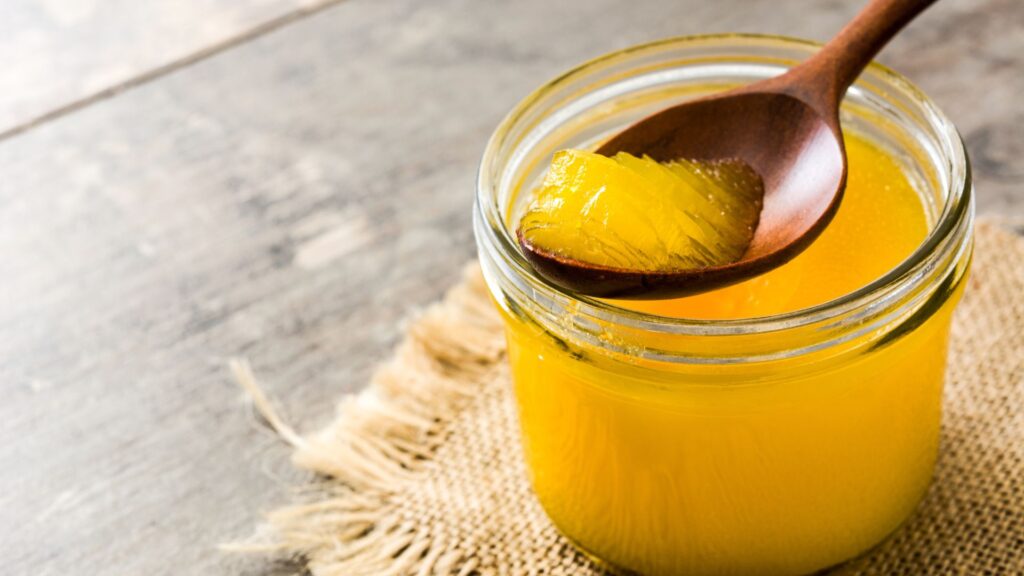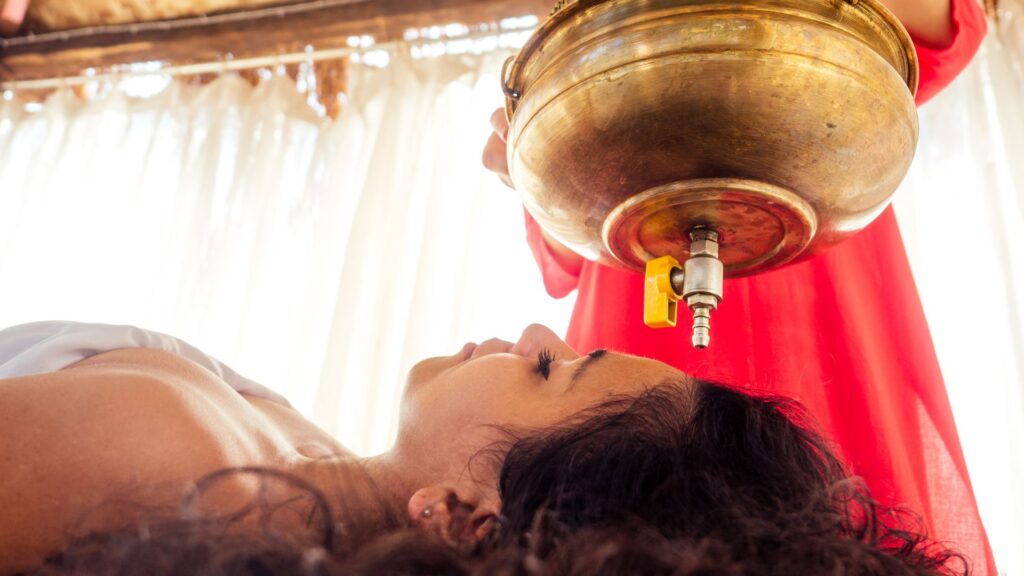
Ghee is a type of clarified butter that originated in ancient India and is a highly revered ingredient in Indian cooking. To make ghee, butter is melted and simmered for an extended period until the milk solids separate from the liquid fat and are then strained out. What remains is a clear, golden liquid with a rich, nutty flavor and a high smoke point, making it suitable for cooking at high temperatures. Ghee has a longer shelf life than regular butter and is prized for its flavor, culinary versatility, and various health benefits.
According to Ayurveda, ghee possesses numerous health benefits and increases Ojas when consumed in moderation and in the right manner. Here are some of the goodness of ghee according to Ayurveda:
- Nutritional Value: Ghee is rich in fat-soluble vitamins like A, D, E, and K, which are important for various bodily functions including vision, bone health, immune function, and blood clotting.
- Digestive Health: Ghee is considered to be easy to digest and can help improve digestion. It is often used in Ayurvedic remedies for digestive issues such as constipation and indigestion.
- Lubricates Joints: According to Ayurveda, ghee is believed to lubricate the joints, promoting flexibility and reducing stiffness. Ghee contains butyric acid, a short-chain fatty acid known for its anti-inflammatory properties, which may help reduce joint inflammation and alleviate pain associated with conditions like arthritis. It is sometimes used in traditional Ayurvedic massage therapies.
- Boosts Immunity: Ghee is thought to possess immune-boosting properties, which can help the body resist infections and diseases. It can support the body’s natural detoxification processes, aiding in the elimination of toxins and promoting overall well-being.
- Supports Mental Health: Ghee is said to nourish the mind and promote mental clarity and cognitive function. It is often recommended in Ayurvedic practices to support overall mental well-being.
- Internal Consumption: Ghee is often consumed orally as a medicinal substance. It is believed to balance the three doshas—Vata, Pitta, and Kapha—according to Ayurvedic principles. Ghee is particularly recommended for individuals with Vata and Pitta imbalances, as it is considered grounding, nourishing, and soothing.
- Medicinal Formulations: Ghee holds a revered position as a therapeutic ingredient in medicinal formulations. It is used as a carrier or base for various Ayurvedic medicinal formulations known as “ghritas” or “sneha”. These formulations combine ghee with herbs, spices, and other natural ingredients to create remedies for specific health issues. Ghritas are believed to enhance the bioavailability and efficacy of the medicinal herbs they contain.
- Ayurvedic Cooking: Ghee is the preferred cooking oil in Ayurveda due to its stability at high temperatures and its ability to carry the flavors of herbs and spices. Ghee is used in preparing various dishes and is believed to enhance the digestive fire (Agni) and promote better absorption of nutrients. Ghee adds a rich, nutty flavor to dishes and enhances the taste and aroma of foods.
- Pregnancy and childbirth: Pregnant women are often advised to incorporate moderate amounts of ghee into their diet through cooking or as a supplement to support their health and the healthy growth of their baby. Its lubricating properties are thought to help in the stretching and dilation of the birth canal, potentially reducing the risk of tearing during childbirth. After childbirth, ghee can help promote lactation, supporting breastfeeding mothers in producing an adequate milk supply for their new born.
- Ayurvedic Therapies: Ghee is utilized in certain Ayurvedic cleansing therapies known as “Panchakarma“. During Panchakarma, ghee is ingested in gradually increasing quantities over several days as part of a detoxification process called “oleation therapy”. This process is believed to help loosen and remove toxins (ama) from the body tissues. Netra Tarpana is a traditional Ayurvedic eye care therapy aimed at nourishing and rejuvenating the eyes. “Netra” means eyes, and “Tarpana” refers to nourishment or soaking.

This therapy involves creating a dam-like structure around the eyes using a paste made from black gram flour or whole wheat flour. The paste is filled with medicated ghee (clarified butter) or herbal oils, which are gently poured into the structure around the eyes. The eyes are then allowed to bathe in this nourishing liquid for some time. Netra Tarpana is believed to be beneficial for various eye conditions such as dryness, strain, irritation, and certain degenerative eye diseases. It is said to improve vision, reduce eye fatigue, and promote overall eye health.
- External Applications: In addition to internal consumption, ghee is also used externally in Ayurvedic treatments. It is applied topically to moisturize the skin, soothe inflammation, and promote healing. Ghee is sometimes used in traditional Ayurvedic massage therapies (Abhyanga) to nourish the skin and relax the body.
- Balances Doshas: According to Ayurveda, ghee has a balancing effect on all three doshas—Vata, Pitta, and Kapha—when consumed in moderation. It is believed to pacify Vata and Pitta doshas, while also supporting Kapha dosha in the right amounts.
- Home remedies: In home remedies, ghee is often used to soothe sore throats by mixing it with honey and consuming it slowly. It’s also employed in skincare routines, believed to moisturize the skin deeply and promote a healthy glow. Ghee is considered a potent carrier of herbal compounds, enhancing their absorption and efficacy. Ghee is sometimes applied to minor burns and wounds to aid in healing and reduce inflammation. It may be applied on lips for smoother shinier lips and prevents drying and chapping. Drinking ghee with lukewarm water on an empty stomach is said to relieve constipation.
It helps in eliminating seasonal allergies. Applying a small quantity of ghee in the nasal passage reduces the effects of allergies in cold weather. Ghee is believed to possess properties that can help alleviate symptoms associated with fever.
It’s important to note that while ghee offers several potential health benefits according to Ayurveda, it should still be consumed in moderation as it is high in saturated fat. Overall, ghee holds a revered status in Ayurvedic medicine due to its nourishing, balancing, and healing properties.